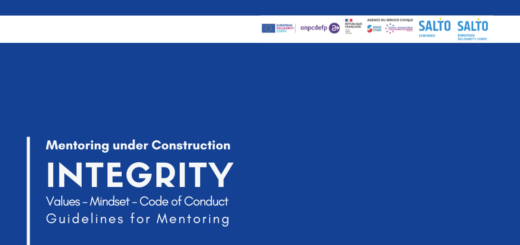Bring Your Group Work to Life. Games and Exercises for Children and Youth
![Bring Your Group Work to Life [Autumn Goodman - unsplash]](https://michaelkimmig.eu/wp-content/uploads/2017/10/Bring-Your-Group-Work-to-Life-Autumn-Goodman-unsplash.png)
Image: Autumn Goodman | Source: unsplash.com | License Creative Commons Zero
Games and exercises for children and youth are bringing your group work to life. They help breaking the ice, bringing people together and building a group, stimulate and increase curiosity and learning, strengthen interaction and communication, and many more things. Games and exercises reinforce learning through experiencing.
A s a facilitator, it is part of your job to accompany group activities in kindergarden, school, youth or community centres, workshops, classes, seminars, international youth exchanges or trainings. Games and exrcises can help you with this as they bring the group work to life: they support breaking the ice between participants and initiate the group building process. They support building trust, enhance curiosity and open participants for new experience. They can also help get discussions started and serve to introduce them. Bring Your #GroupWork to Life! 5 #game collections to get started with Share on X Games and exercises reinforce learning through experiencing. Experiential Learning has proven a valuable learning approach: by simulating actual experiences of our lives, games and exercises help us to reflect and create practical knowledge for future actions. They may also introduce a certain amount of complexity, thereby stimulating a process of action-experience-reflection-conclusion throughout the proceedings.
The first three game collections include mostly energizers, ice-breakers and smaller group-building activities. The games are presented in no particular order. Facilitators may pick and choose those that are most appropriate for their specific purpose and context.
- 100 ways to energise groups
- Ready, Steady, Go!
- Non Formal methods for no-common-language contexts
If you are looking for something more specific, one of the following two brochures are recommended. Their games and activities are thematically sorted.
- Games and Exercises for International Workcamps and Seminars
- Games and Exercises: A manual for facilitators
All five game collections and toolkits are developed and tested in an intercultural context.
Just play. Have fun. Enoy the game.
Michael Jordan
100 ways to energise groups: Games to use in workshops, meetings and the community
by The International HIV/AIDS Alliance, 2002
“100 ways to energise groups” includes different types of games, mostly energizers and ice-breaking games. This game collection is for anyone working with groups of people: in a workshop, meeting, seminar or community setting.
Ready, Steady, Go!
by Aida, Flavia, Maja, Manuel, Tisho EVS Creating Waves 2013
“Ready, Steady, Go!” is a games and activities collection created by EVS volunteers of Creative Space in Hollókő, Hungary. The book is made for all who work with children: social workers, volunteers, facilitators, animators, teachers, etc. It also includes a brief chapter with some guidelines about leading a game and interaction with children, as well as a small dictionary with useful expressions in six different languages.
Non Formal methods for no-common-language contexts
by C.A.D.D.R.U. 2012
If language is a barrier or groups do not speak a common language, this toolkit might be helpful for you. Created by volunteers with the “Volunteers across Frontiers” project (C.A.D.D.R.U. – Assistance Center for Sustainable Development and Human Resources) this collection presents 55 games and activities.
7 Tips for Using Games and Exercises
- Try out games and exercises yourself first if you don’t know them.
- Make sure you are clear in your mind about the aims of a game or exercise.
- Introduce games and exercises sensitively; take account of the situation and mood of the group.
- Explain the rules of the game in a clear and easily understood way; give examples and demonstrations.
- Motivate the players to join in, but don’t force them through moral blackmail! Participation is voluntary.
- Carry an exercise through from beginning to end but stop before the mood for playing is destroyed through boredom or tiredness.
- Play according to the rules, but take up and introduce players’ wishes for possible variations to the games or alterations to their form.
Games and Exercises for International Workcamps and Seminars
by Michael Kimmig, 2015
“Games and Exercises” is a collection of games and exercises: from bringing individuals together, breaking the ice, activating groups, developing trust, till reflecting and evaluating the group work and process. This brochure is meant for leaders and facilitators of international workcamps, seminars and trainings.
Content
- Getting to know each other & Starting a Programme
- Energisers & Warm-ups. Games for Breaks
- Thematic Games. Exercises for the Study-Part
- Body Contact & Trust. Acting & Improvising
- „What happened?“ – Evaluation & Reflection
Games and Exercises: A manual for facilitators and trainers involved in participatory group events
by UNICEF, 1998
The manual “Games and Exercises” is a valuable resource to facilitators and trainers working in an international setting. It is not intended to stand on its own. Some knowledge and experience in participatory facilitation and training is recommended.
Content
- Ice-breakers and Getting to know each other
- Warm-ups and Energisers
- Communication
- Perception
- Intercultural Communication
- Team-building and Cooperation
- Conflict Management
- Case Studies and Role-Play
- Gender Analyses and Sensitization
- Creativity and Problem Solving
- Relaxation and Meditation
- Evaluation
- End Games
More games and activities on Pinterest board CreActivity and Play.



